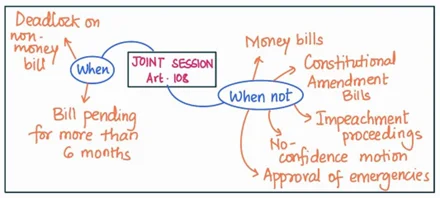Answer:
| Approach:
Introduction
- Introduce the concept of joint sessions of Parliament under Article 108 of the Indian Constitution and its purpose in resolving legislative deadlocks between the Lok Sabha and Rajya Sabha.
Body
- Divide the body into two main sections.
- Occasions when a joint session is normally held.
- Occasions when a joint session cannot be held.
Conclusion
- Conclude, emphasizing the constitutional provisions that guide these processes.
|
Introduction:
The Indian Constitution provides for the joint session of both houses of Parliament under Article 108. A joint session of the Parliament is a special mechanism to resolve legislative deadlock between the Lok Sabha (House of the People) and the Rajya Sabha (Council of States).
Body:
Occasions when a joint session is normally held:
- Deadlock on a non-money bill: If a non-money bill is passed by one house and rejected by the other house or if both houses fail to agree on the amendments to be made in the bill, a joint session can be convened. The President of India can summon a joint session.
- Bill pending for more than six months: If a bill passed by one house is sent to the other house and remains pending for more than six months without any decision, the President can call a joint session.
In both cases mentioned above, the joint session is presided over by the Speaker of the Lok Sabha or, in their absence, the Deputy Speaker or, if both are absent, a person determined by the President.

Occasions when a joint session cannot be held:
- Money bills: Joint sessions cannot be called for money bills, as the Rajya Sabha’s powers are limited in this context.
- Constitutional amendment bills: These bills need to be separately passed by both houses with a special majority as specified in Article 368 of the Indian Constitution.
- Impeachment proceedings: A joint session cannot be called for impeachment proceedings against the President of India, as the process requires each house to separately pass a resolution with a two-thirds majority.
- No-confidence motion: A joint session cannot be held to discuss and pass a no-confidence motion against the government, as this motion applies only to the Lok Sabha.
- Approval of ordinances: Joint sessions are not applicable for approving ordinances issued by the President when Parliament is not in session. Ordinances must be separately approved by both houses within six weeks of the Parliament’s reassembly.
Conclusion:
The Indian Constitution provides for joint sessions of Parliament to resolve legislative deadlocks on non-money bills. However, joint sessions cannot be held for money bills, constitutional amendment bills, impeachment proceedings, no-confidence motions, and approval of ordinances.

